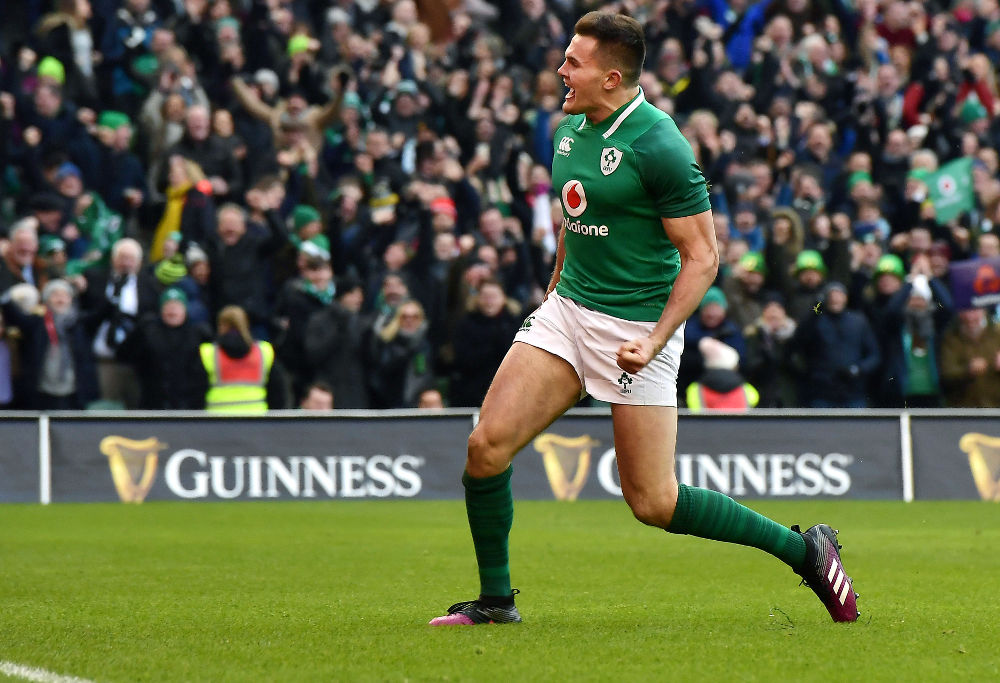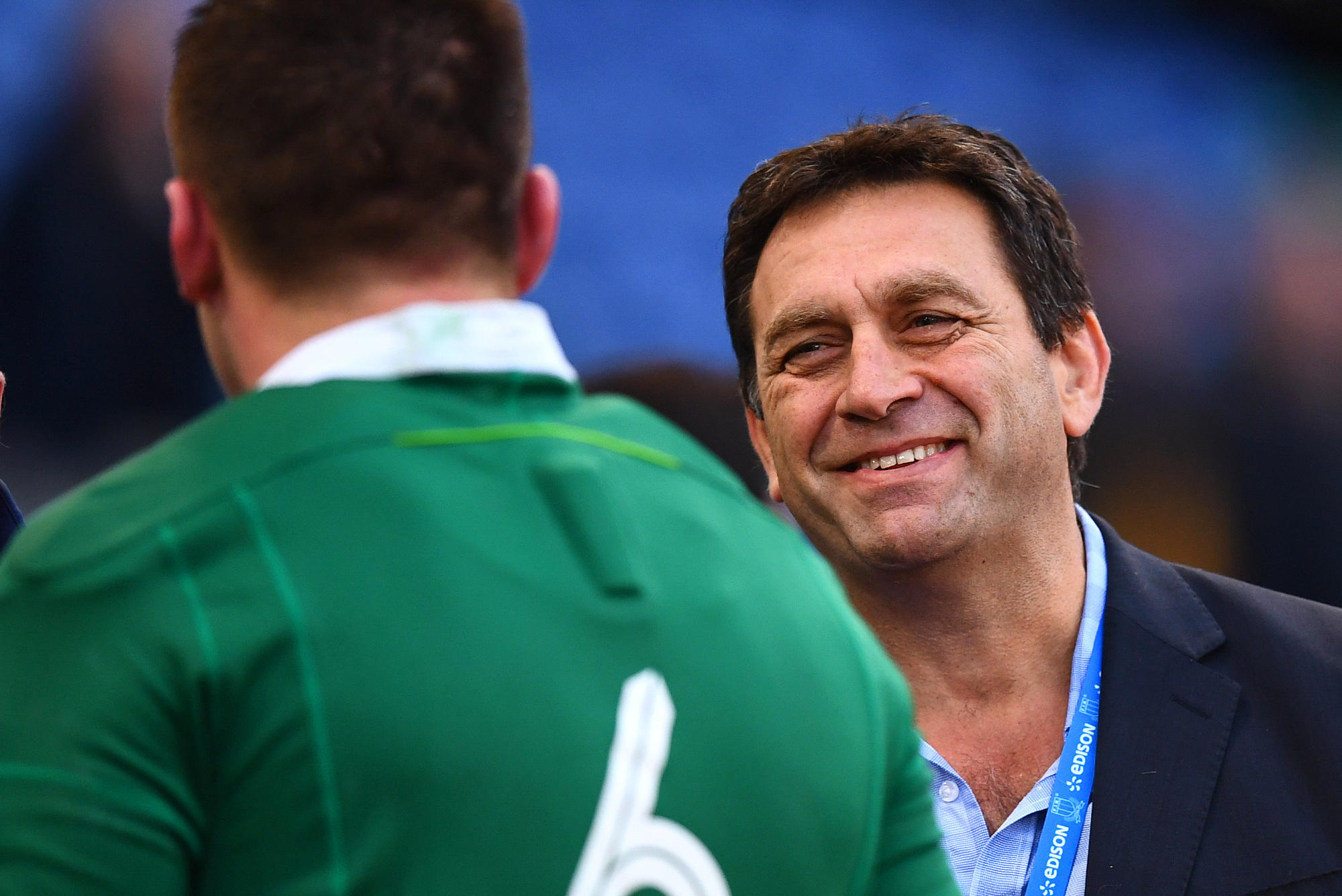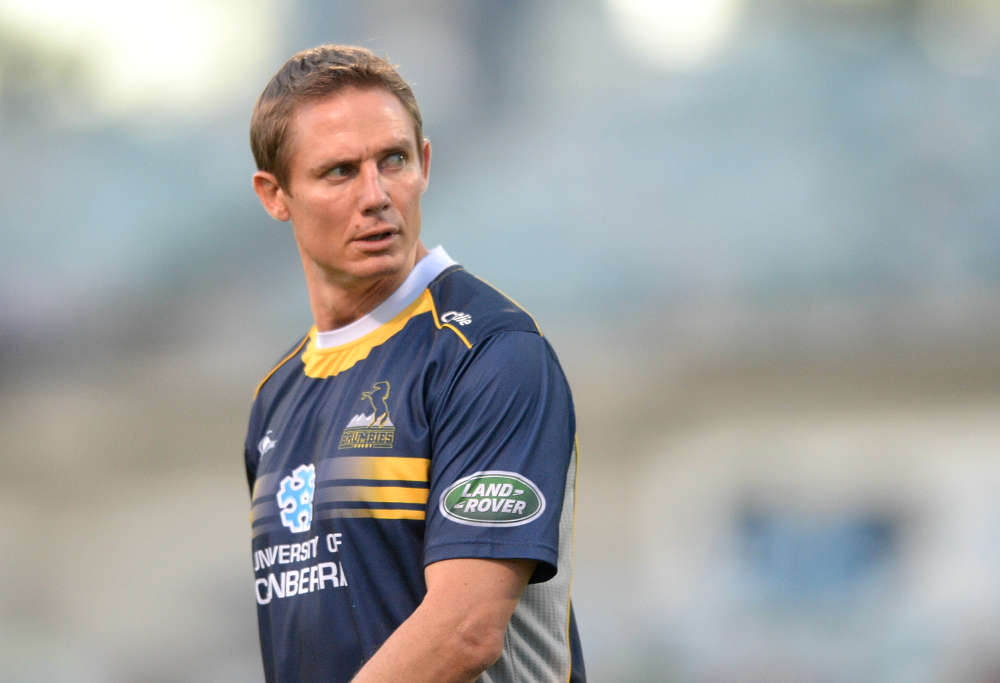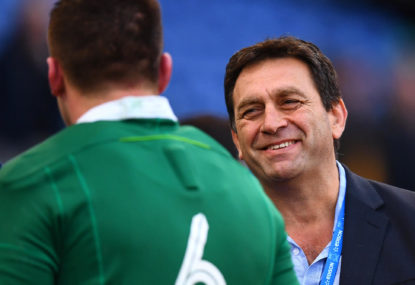Rugby Australia has started marketing the mouth-watering June Test series of the Wallabies against the Six Nations Grand Slam champions Ireland with the battle cry, “Our Blood Runs Gold.”
After Ireland’s wonderful Grand Slam triumph over the weekend with its monstering of England at Twickenham, only their third in the long history of the tournament, my first reaction to Rugby Australia’s slogan is that it really should read, “Our Blood Runs Cold.”
For this is going to be an extremely difficult series for the Wallabies to win. The national side, players and coaches, are going to be put through an examination that will be much more searching than that made by England in 2016 during their 3-0 whitewash of Michael Cheika’s team.
This current Ireland side is already one of its greatest teams. It has won a Six Nations Grand Slam, defeated the All Blacks in 2016 for the first and only time in a series of Tests going back to 1905, and has defeated the Springboks in South Africa for the first time.
Right now, too, they’ve chalked up a run of 12 successive Test wins, a record for any Ireland Test side.
As I watched Ireland comprehensively out-play and out-think a lumbering, physically and mentally, England side, I began to realise that the inventive multi-phase game the champions were playing came straight out of the Rod Macqueen playbook.
I noticed, too, that the ball-in-hand-sequence-game of Ireland had the intention of releasing the outside backs into spaces out wide.
Ireland’s method, although there were superficial similarities, was entirely different from the England playing-by-numbers game.
If England did not achieve a break-out or penalty after several phases, the boot was put to the ball.
Ireland, on the other hand, was prepared to go through their phases patiently and methodically, sometimes up to 16 times, to engineer situations where they had overlaps out wide. There was a point to every carry in this method.
In Rod Macqueen’s time as coach of the Brumbies and the Wallabies, I called this method “taking the bricks out of the defensive wall, one by one.”
When enough bricks were taken out of the defensive wall, the fast wingers were unleashed to race through the gaps.
Just as Joe Roff was the master finisher who capitalised on the overlaps created by his Brumbies and Wallabies teammates, Ireland had Jacob Stockdale, a youngster who scored a crucial try against England and chalked up a Six Nations-record seven tries during the 2018 tournament.

(Photo by Charles McQuillan/Getty Images)
Ireland were just as composed, concentrated and well-coached on defence, as well.
They were, for instance, smart in how many players were thrown into specific rucks. Often no one tried to create turnovers. On other occasions, when an England player went to ground without clean-out support, a number of Ireland players piled in to create a turnover or a penalty.
On defence, too, Ireland were smart in the way players were conscious of where they were on the field and reacted accordingly.
When a kick was made from deep inside the Ireland 22, for instance, their forwards actually retired as the ball sailed over their heads and waited for a chaser to put them on-side. Then the line moved forward as a single defensive unit.
Coach Joe Schmidt added a traditional Irish feature to the Macqueen ensemble method with Johnny Sexton’s towering Garryowen that came to earth from a great height, with snow flakes literally on it, around England’s goal-line. Ireland scored their first try from England errors made in trying to cope with the pressure generated by the fabulous high kick and chase.
The best aspect of Ireland’s play was that it was positive on attack and defence. As Ireland’s captain Rory Best stated after the famous victory, “Right from the off we tried to attack England with and without the ball, it was a very ferocious Test match right throughout.”
Schmidt deserves all the credit that is going to come to him. It is always great coaching, but rarely seen, when a team plays with everyone in synch, like a great orchestra in full flow. In Ireland’s case, the conductor was in the stands while his team played exactly how he wanted them to play.
What a triumph of playing and coaching this was for the Ireland team and Schmidt.
A couple of other points about Schmidt, though, to establish that despite the Macqueen elements to the way his team plays he has brought his own particular skills and insights into his coaching.
He doesn’t like his players talking very much to the media, aside from in-depth profiles. I would say that this is a welcome relief for pundits. I can truly say that I have never heard a Wallaby in the professional era say anything remotely insightful when interviewed after or before a match.
He is particularly smart at picking specific players and tactics for specific games. Against England he picked a muscular and abrasive pack, giving up some height in the lineout for power and work rate.
He is good at bringing in new players and smart in identifying those youngsters who are ready for the big time and those who need more work to bring them up to pace.
There is no doubt that Schmidt will be made offers he can’t refuse from the New Zealand Rugby Union to take over the coaching of the All Blacks, in one capacity or another (there might be a manager), in 2020 to begin the Rugby World Cup 2023 cycle.
But there is one of the key off-the-field people involved in Ireland’s grand slam who will be available to Rugby Australia to take over from Michael Cheika after the 2019 Rugby World Cup tournament, namely Ireland’s high performance manager, David Nucifora.

(Photo By Stephen McCarthy/Sportsfile via Getty Images)
And, come to think of it, Nucifora had the knowledge of the Macqueen game from his successful stint as the coach of the Brumbies. I have no doubt that this knowledge was passed on to Schmidt to incorporate into Ireland’s successful game plans. If Nucifora becomes the coach of the Wallabies in 2020, he will bring back this MacQueen game knowledge to a team that lost it when the master left the Wallabies in 2003.
There is the suggestion that Macqueen left the Wallabies because he could not get on with some of the senior players anymore.
A similar sort of coach-leading players acrimony occurred at the Brumbies in 2004.
This acrimony involved the virtual sacking of Nucifora in April 2004, at the beginning of his final season with the Brumbies. It is part of the folklore of Australian rugby that the Brumbies, coached by Nucifora, won their second and last Super Rugby title in that year.
Viewers of the final might have wondered why the players and the coach seemed to be so isolated from each other at the award ceremonies after the match.
What was the story behind all of this?
On 22 November, 2007 John-Paul Moloney published an important article, ‘Nucifora, the untold story‘, that pulled back some (but not all) of the curtains that shrouded the mystery of Nucifora’s sacking as the coach of the Brumbies.
According to Moloney, the sacking was provoked by “a player revolt.”
The players were the senior players, not any younger players: “Going into the 2004 season 12 players, including more of the team’s Wallabies, had been signatories to a letter urging the Brumbies to address problems they had with Nucifora’s coaching style.”
A meeting to thrash out the problems failed: “The ACT Rugby Union board met not long after and, largely influenced by the views of the rebellious players, it decided that Nucifora’s tenure would not be extended into a fourth year.”
Interestingly, although several of the senior players involved in the revolt have had roles in the Brumbies coaching staff, the side has not won a Super Rugby title since then.
Nucifora, for his part, subsequently had an unsuccessful stint as a high performance manager and then coach of the Auckland Blues, a side that over the last decade or so has resisted all the efforts of coaching staffs to win a Super Rugby trophy.
He then had a stint as high performance manager for Rugby Australia in a coaching set up under Robbie Deans that ended with the semi-final defeat of the Wallabies by the All Blacks in the 2015 Rugby World Cup.
Nucifora then took up a similar job with the IRFU. He has been part, as a consequence of this appointment, of several years of great success by Ireland that was capped by the historic victory over England at Twickenham over the weekend.
To my mind, Nucifora is the stand-out candidate to take over the Wallabies after Michael Cheika stands down after the 2019 Rugby World Cup tournament.
Here is the reasoning behind this assertion. There is no other Australian in the coaching business, outside of Nucifora, with the required qualifications, coaching experience and record of success for the job.
In a recent article on ESPN online titled, ‘Larkham no shoo-in for Wallabies job despite Cheika’s support‘, Greg Growden outlines the difficulties facing Rugby Australia in making a decision about Cheika’s successor.
“Michael Cheika, in an interview with Iain Payten in the Daily Telegraph in Sydney, has revealed he will move on if the Wallabies don’t win the 2019 Rugby World Cup …
“At least Rugby Australia have some time to work out who should replace Cheika. That time will be useful because the list of candidates is hardly rousing – highlighting once again one of the Australian’s game more glaring problems, the dearth of quality, experienced coaches at all levels.”
Growden notes that Dan McKellar (Brumbies) and Brad Thorn (Queensland Reds) are in their first season as head coach. Dave Wessels (Rebels) is in his second year.
None of these coaches, therefore, will have the experience to take over a national side.
This leaves Stephen Larkham. As Growden points out: “Larkham has his detractors. it hasn’t been forgotten that under him the Brumbies lost a great deal of their renowned attacking panache, and became a stodgy forwards-oriented unit.”
This is true. Moreover, Larkham does not have any trophies on his record. The Brumbies made the finals in his years there as coach but never won the Super Rugby tournament.

(AAP Image/Lukas Coch)
Also, the Wallabies backs under his guidance have hardly been a match-winning unit.
Growden has a valuable insight on this point: “Cheika is already pushing for his Wallabies assistant coach Stephen Larkham to be Australia’s next Test coach. But such an endorsement could turn into a hospital pass – especially if the Wallabies lose their way over the next 18 months.”
The fact is that Cheika’s coach’s choice for his successor at the Waratahs, the New Zealander Daryl Gibson, has not been a success for the franchise.
Anyway, the notion of jobs for the boys in coaching and on playing rosters, which was a product of the Brumbies insurrection against Nucifora, needs to be taken out of Australian rugby. It has been a blight on the management of the game here for too long.
There is very little in Larkham’s coaching history to suggest that he will suddenly become a world-class coach once he gets control of the Wallabies.
To be brutal, Larkham has not won a title of any significance. His Brumbies were boring and eminently beatable in big matches. He left the franchise in a mess with the new coach Dan McKellar being forced to change all the playing patterns in the hope of making the team competitive if and when it makes the finals.
Moreover, the temperament of taking no prisoners that helped to make Larkham a great player is working against him being a successful coach.
In Saturday’s Sydney Morning Herald, Georgina Robinson had a delightful Q and A with Angus Gardner, the Australian who refereed the England–Ireland game so expertly.
During the interview there was this exchange:
“GR: What’s the most pressure you’ve felt in a game?
“AG: I’d say the Brumbies–Highlanders quarter-final two years ago. We had a controversial TMO decision with the Brumbies (winger Lausili Taliauli) going over (in the 75th minute) but we couldn’t see whether it had been scored or not …
“GR: Folklore suggests Steve Larkham still hasn’t spoken to you.
“AG: Um, I’ve reffed the Brumbies since then so we have, but probably haven’t sat down for a coffee or a beer. Perhaps we need to change that.”
Successful coaches at the international learn to live with the ups and downs of refereeing decisions. Larkham, like Cheika, does not seem to know how to do this. And this will work against any team he coaches, just as it has for Cheika.
Why would any Australian coach want to hold a grudge against the best referee Australia has produced in recent years?
Memo to Raelene Castle: While Ireland is touring Australia in June and making a fortune for Rugby Australia, take time out to contact David Nucifora who will be with the touring party and sign him up as the next coach of the Wallabies.
































































































